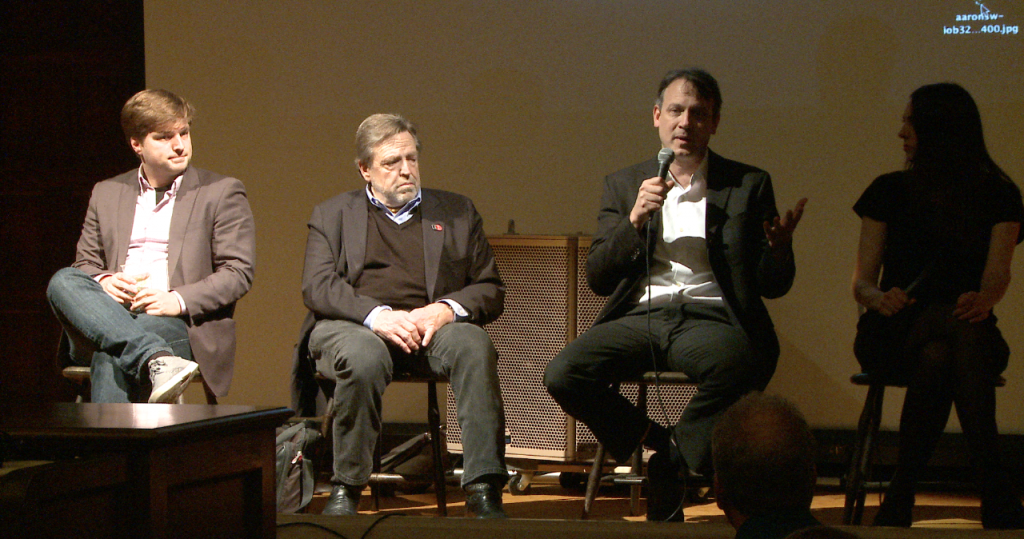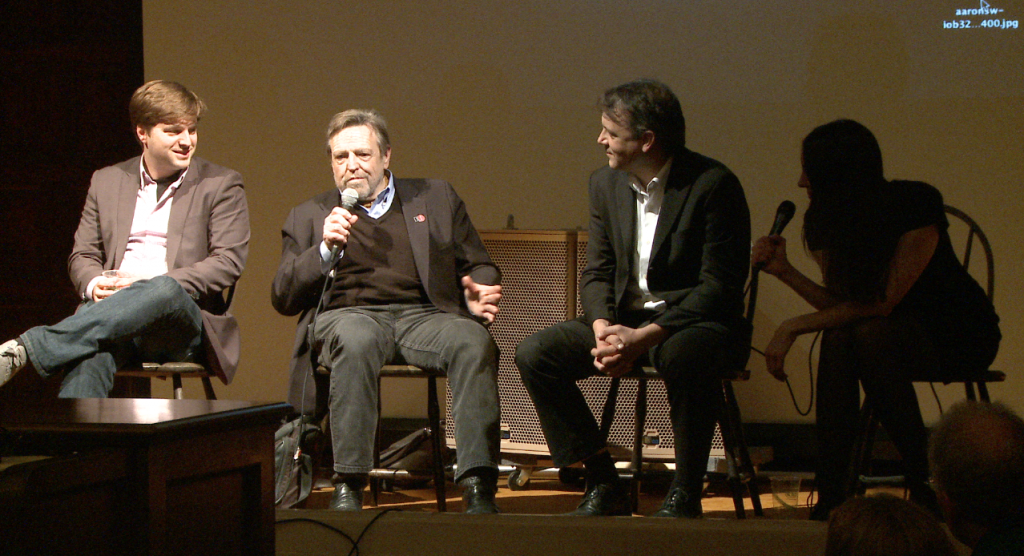
Audio clip:
Link to full Aaron Swartz Day 2014 Video.
The transcript below has been edited slightly for readability.
Lisa: Brian, when you were making this movie, and you had lots and lots of footage, how did you go about deciding which story you were actually gonna tell? One of the things that people who are not familiar with the story sometimes say to me, when they see your film for the first time, is that they are curious about the way that you handled the suicide at the end.
For me, it made sense, because, one thing that I think a lot of us could agree on, when we talked about it, after he died, was that it *didn’t* really make sense. He had had bouts with depression, from time to time, like a lot of people, but it wasn’t really anything that anyone was expecting, or that anyone could go “oh, we knew that was gonna happen,” or, “we were afraid that was going to happen” — that sort of thing.
I liked the way you sort of got that across in the film. How did you decide how you were gonna treat that issue? It was very sad at the end, but you definitely decided not to dwell on it.
Brian: Yeah. I mean, so much was written about Aaron, right after he died. And some of it, at least, had to do with depression or speculating on the role that it might of played in his death. So, I certainly, read everything. I mean, before we even started filming – when I was still in the early stages, I tried to read everybody’s take on it. A lot of people were doing first hand accounts and stuff, but the New Yorker did a piece that was almost exclusively focused on that issue. And so I decided to take it, and basically just ask the people who were closest to him and try to understand what role it played.
The conclusion I came to is that, Taren, who lived with him during the last years of his life, she doesn’t believe that he suffered from that. Or, that he may have had something like that in his early 20s, but not when she lived with him. His brothers and other people close to him describe a kind of sensitivity, of carrying the weight of the world on his shoulders; the need to want to fix everything, almost. And so I just kind of weighted, based on what I found. I think that’s the short answer.
I think some of that was letting the government off the hook, in some ways. That’s just the conclusion that I came to. That assigning too much to “depression,” was a way of sort of distracting from this two year legal nightmare that would have certainly put anybody in a difficult position.
Lisa: Right. As if it was something where, he could have had a bad day, and done anyway, and not something that he was driven to from the situation. I guess that’s what bothered me too, when people talked about the depression, and they left out the whole part about the relentless, daily persecution by this case on his life.
Brian: Yeah, I mean, people go through worse and don’t take their own life, obviously. So, it was just something that I thought a lot about. I basically proceeded by talking to people who were close to him and trying to understand who he was, and what role that played, and I think I got some pretty candid, and pretty honest answers about that.
John Perry: I don’t have reason to say this, but I’m gonna say it anyway. It occurs to me, even though I know that Aaron Swartz would’ve been a truly extraordinary force in the world, had he lived. I’m not certain that he would’ve been the extraordinary force in the world that he became by dying when he did, and I’m not certain that he didn’t know that. It’s not out of the question in my mind that he made a strategic and very hard decision to allow himself to be a martyr to this cause at this particular point.
Lisa: I thought of that too, except that one would say that making a pragmatic decision about the timing of taking your life isn’t necessarily a sane decision to make.
